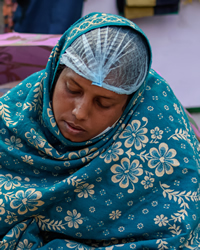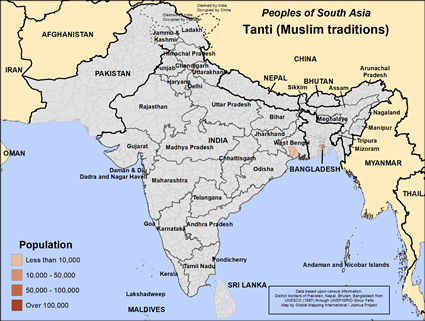The Tanti are said to have originated as the weavers, providers of cloth, back in history as far as ancient Bengal. They were known for great skill in weaving and the ability to produce both fine linens as well as more common everyday fabrics. Not too long ago, virtually every Tanti home would have had a loom and cloth present.
The vast majority of the Tanti people are Hindus who live throughout northern India, but there is a small Muslim Tanti community in West Bengal (India) and neighboring Bangladesh.
Today, much of their trade has been taken over by factory production and imported goods. Many are now doing subsistence level work either of weaving or other manual labor within villages. They tend to live in villages outside of major metropolitan areas. They are slightly less concentrated than some groups because their designation started with their occupation rather than a particular tribe or group. They tend to be mixed with other lower caste groups that are also spread throughout the region. This makes it difficult to identify any one area as specifically Tanti.
They often do not have clean water or steady food supply. They have low status in both India and Bangladesh. A few have moved into cities and achieved an education and greater roles in society. This is still, however, limited to a small percentage of their overall population.
The Tanti people are Sunni Muslims who believe that the supreme God, Allah, spoke through his prophet, Mohammed, and taught mankind how to live a righteous life through the Koran and the Hadith. To live a righteous life, you must utter the Shahada (a statement of faith), pray five times a day facing Mecca, fast from sunup to sundown during the month of Ramadan, give alms to the poor, and make a pilgrimage to Mecca if you have the means. Muslims are prohibited from drinking alcohol, eating pork, gambling, stealing, slandering, and making idols. They gather for corporate prayer on Friday afternoons at a mosque, their place of worship.
The two main holidays for Sunni Muslims are Eid al Fitr, the breaking of the monthly fast and Eid al Adha, the celebration of Abraham's willingness to sacrifice his son to Allah.
Sunni religious practices are staid and simple. They believe Allah has pre-determined our fates; they minimize free will.
In most of the Muslim world, common people depend on the spirit world for their daily needs since they regard Allah as too distant. Allah may determine their eternal salvation, but the spirits determine how well they live on a daily basis. For that reason, some Muslims appease spirits using charms and amulets to help them with spiritual forces. More orthodox Muslims consider these practices heretical and un-Islamic.
The Tanti people need to find ways to earn a better living. Their weaving skills have been replaced by machines. Perhaps Christ followers with the right skills can teach them how to make a better living in today's economy. Muslim Tanti people need to put their trust and identity in the hands of the loving God of Creation who sent his son to make it possible for them to enter the Kingdom of God.
Pray for a "Book of Acts" type of movement to Christ among the Tanti people in Bangladesh and India.
Pray God will have mercy on the Tanti community doing whatever it takes to place them in a position to receive him.
Pray for the Holy Spirit to move among Muslim Tanti family and community leaders to seek his face and enjoy his blessings.
Pray for the Lord to thrust out workers who will be compelled to nurture a disciple making movement among the Tanti people.
Scripture Prayers for the Tanti (Muslim traditions) in Bangladesh.
| Profile Source: Joshua Project |











